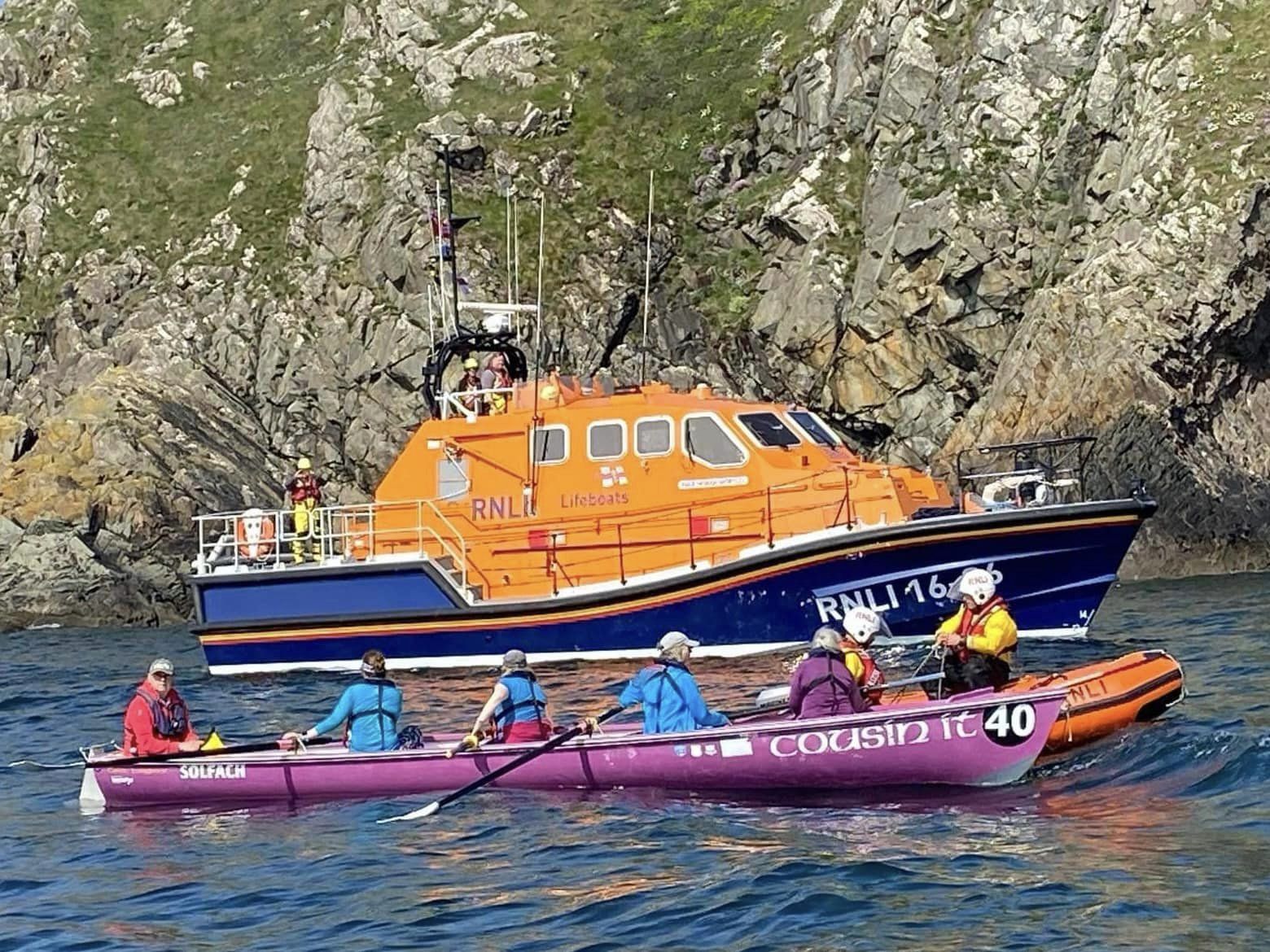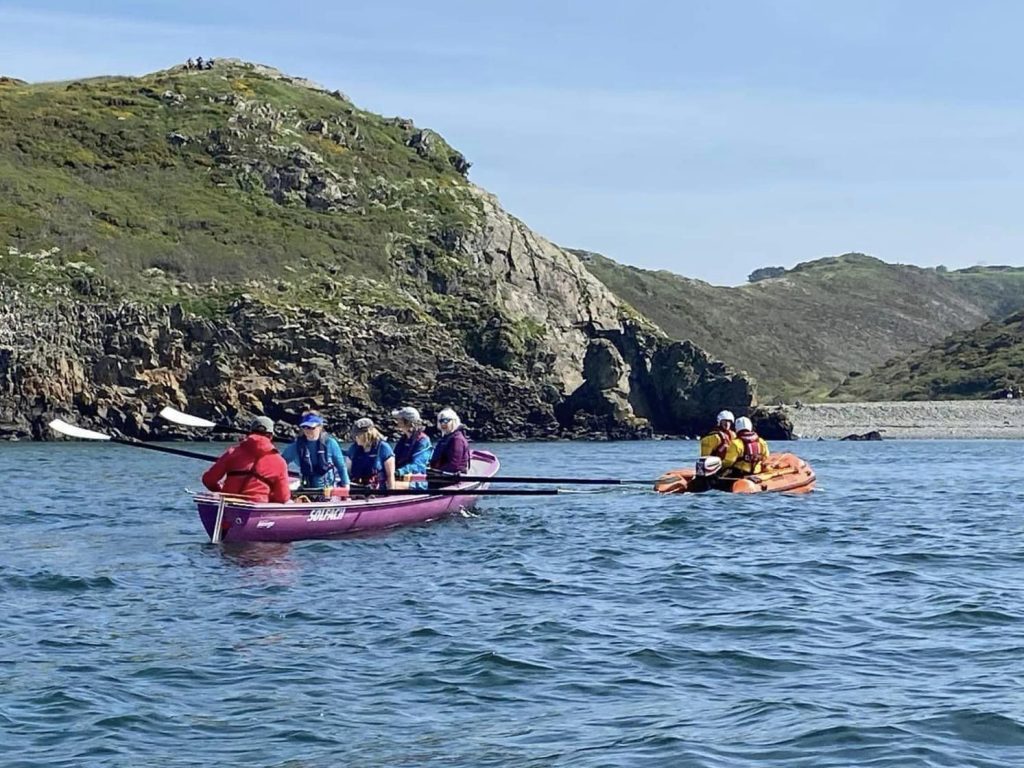Charity
St Davids RNLI teams up with Solva Rowing for joint exercise

THE RNLI St Davids lifeboat crew joined forces with Solva Rowing and Watersports Club for a unique joint training exercise on Saturday, May 11, 2024. The session focused on practising medical evacuation and tow techniques using a Celtic longboat, providing an opportunity for both lifeboat and rowing crews to enhance their rescue skills.
The training aimed to prepare volunteers for a variety of maritime emergency scenarios, ensuring that they are well-equipped to handle situations that may arise at sea. The use of the traditional Celtic longboat added an extra layer of challenge and realism to the exercise, simulating conditions that could occur during actual rescue operations.

The collaboration between the two groups was not only a chance for skill enhancement but also a way to strengthen community ties and mutual understanding among the local sea-going organisations. The exercise was documented in photographs by Lyn Jenkins and Cathy Morton, capturing the intense yet constructive nature of the training.
This proactive approach by both the RNLI and Solva Rowing and Watersports Club underscores the commitment of local maritime groups to safety and preparedness, ultimately aiming to ensure that their volunteers are ready and able to save lives at sea effectively.
Charity
NSPCC Cymru launches Baby Steps scheme to support new parents across Wales

New perinatal service aims to help families cope with the pressures of early parenthood
NSPCC CYMRU has launched a new perinatal support programme aimed at helping expectant and new parents across Wales navigate the challenges of caring for a baby.
The Baby Steps service, a redeveloped early-intervention programme, is designed to give parents the tools, confidence and emotional support needed during pregnancy and in a child’s first months of life.
The service was officially launched this week at an event held at BT headquarters in London, attended by The Duchess of Edinburgh, who is a Patron of NSPCC, alongside childcare professionals and public figures.
Baby Steps will initially be piloted through three NSPCC hubs, including the Wales hub, placing Cymru at the forefront of the charity’s rollout of the service.
Carl Harris, Assistant Director for the NSPCC Wales hub, said the evidence-based programme could make a significant difference to families during a crucial stage of a child’s development.
He said: “The early stages of a baby’s life can feel daunting for parents, as they face new challenges every day while trying to give their child the best possible start.
“It is a critical time for a child’s development, and perinatal services like Baby Steps can offer enormous support to help parents through what is an exciting, but sometimes very difficult, period.
“NSPCC Cymru is proud to be leading the way in rolling out this service and supporting parents and children across Wales.”
Figures released alongside the launch highlight the scale of need. During 2024/25, the NSPCC Helpline referred more than 3,800 children under the age of two to external agencies across the UK, including police and social services. This represented almost one fifth (18%) of all referrals made by the Helpline on behalf of a child during the year.
One father who contacted the service described the pressures faced by new parents, saying: “We just can’t get our baby into a routine. It’s been eight weeks, we’re new to parenting and have different opinions, and then our friends all have different advice. It’s causing major arguments and nothing’s working.”
In addition to Baby Steps, the NSPCC website offers a wide range of guidance for parents and carers, including advice on bonding with babies and raising children safely.
Chris Sherwood, Chief Executive of the NSPCC, said the charity was pleased to mark the launch with a royal visit.
He said: “It’s always a privilege to be part of a Royal visit, and we were delighted that HRH The Duchess of Edinburgh was able to join us to celebrate our Baby Steps service.
“As our Helpline data shows, the first couple of years of a child’s life can be an extremely difficult time for parents. Our Helpline regularly hears from parents struggling with the pressures of a newborn, as well as from concerned members of the community.
“The Baby Steps service provides essential building blocks to help parents navigate the earliest stages of their child’s life and ensure they thrive. Any parent or carer who needs support or advice can always contact the NSPCC Helpline.”
.
Charity
Milford Haven Round Table thanks town council for backing major community events

MILFORD HAVEN ROUND TABLE has formally thanked Milford Haven Town Council for its continued support, saying the council’s backing helps make some of the town’s biggest free events possible.
The group said the Town Council is a major supporter of its work in Milford Haven and plays a vital role in enabling community celebrations including the Milford Haven Carnival and the annual Fireworks Extravaganza, which draw thousands of people.
Representatives from the Round Table said it was “great to catch up” with the Mayor, Councillor William Elliott, at the Christmas Lights Switch On in December, where they presented a small token of thanks to mark another year of collaboration.
Milford Haven Round Table said it is proud to support the town through fundraising, volunteering and delivering events which create memories, raise money for local causes and strengthen community spirit.
The group added that none of its work would be possible without strong partnerships across Milford Haven, and thanked the Town Council for its “ongoing support, trust and commitment” to the town and its residents.
Charity
Local car enthusiast donates treasured classic to Paul Sartori Hospice at Home

THE PAUL SARTORI FOUNDATION is celebrating an act of generosity from local classic car enthusiast Roger Handcock, whose donation of a cherished Mazda MX5 has helped raise £5,500 plus Gift Aid for end-of-life care across Pembrokeshire.
Roger made the decision to donate his 1990 MX5 after a period of ill health over the summer meant the car was no longer being driven. He said he wanted it to be enjoyed — and properly cared for — by someone who would appreciate it as much as he had.
A long-standing member of the Pembrokeshire Classic Car Club, Roger said: “I was ill this summer and my 1990 MX5 was not getting any use, so I decided to part with it in the hope that it would bring some enjoyment and be maintained properly. However, I didn’t have the energy to try to sell it for the highest possible price.
“Being a member of Pembrokeshire Classic Car Club, I decided to donate the car to Paul Sartori Hospice at Home which is one of their favoured charities. In the end a great price was secured for the vehicle, and I am pleased to say that it will still be seen on Pembrokeshire’s roads.”
The Foundation said donations like Roger’s provide a vital source of income, helping to fund free hospice at home support for people nearing the end of life. The service enables patients to remain in the comfort of their own homes, supported by specialist equipment and professional care, while also offering help to families at an incredibly difficult time.
A spokesperson for the Paul Sartori Foundation said they were grateful for Roger’s kindness, adding that the impact of his gift would continue long after the MX5 begins its next chapter on Pembrokeshire’s roads.
Brave donation: Roger Handcock with Paul Sartori Events and Fundraising Officer Joanne Lutwyche (Pic: Paul Sartori Foundation).
-

 Health4 days ago
Health4 days agoConsultation reveals lack of public trust in health board
-

 News5 days ago
News5 days agoCaldey still unsafe, survivors warn — despite Abbey’s reform claims
-

 Community5 days ago
Community5 days agoPembrokeshire students speak at national Holocaust Memorial Day event
-

 News7 days ago
News7 days agoWales warned against single police force as Lib Dems cite Scotland ‘lesson’
-

 Crime7 days ago
Crime7 days agoMilford Haven man appears in court charged with burglary and GBH
-

 Business7 days ago
Business7 days agoDuke of Edinburgh Inn in Newgale on the market for £325,000
-

 Local Government6 days ago
Local Government6 days agoTribunal over former Neyland councillor’s conduct adjourned
-

 News5 days ago
News5 days agoKurtz raises Gumfreston flooding in the Senedd as petition deadline nears





















